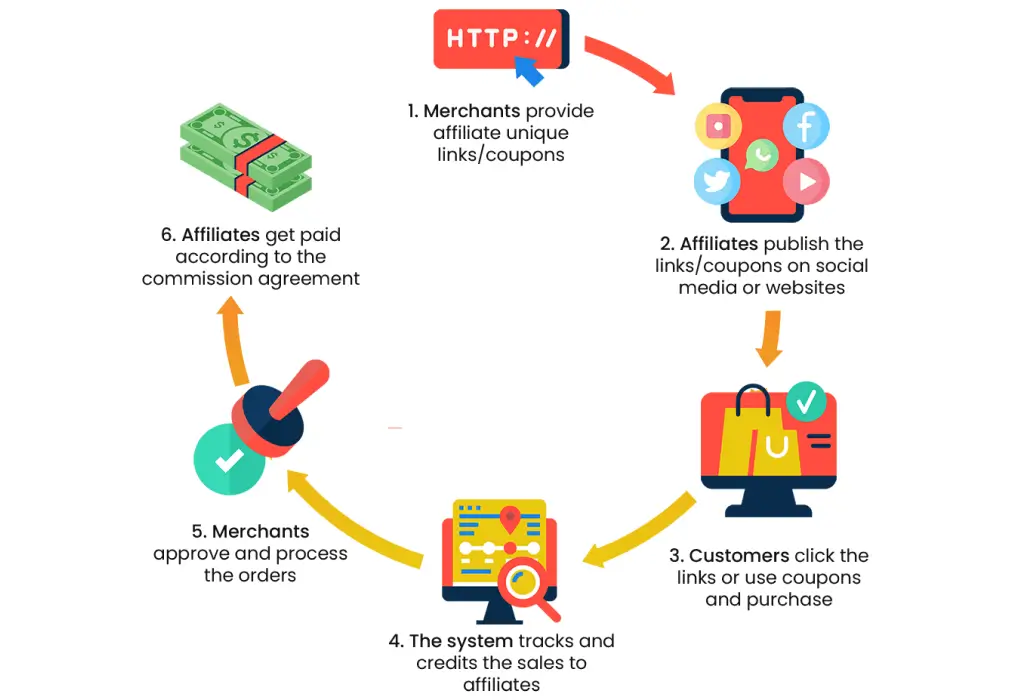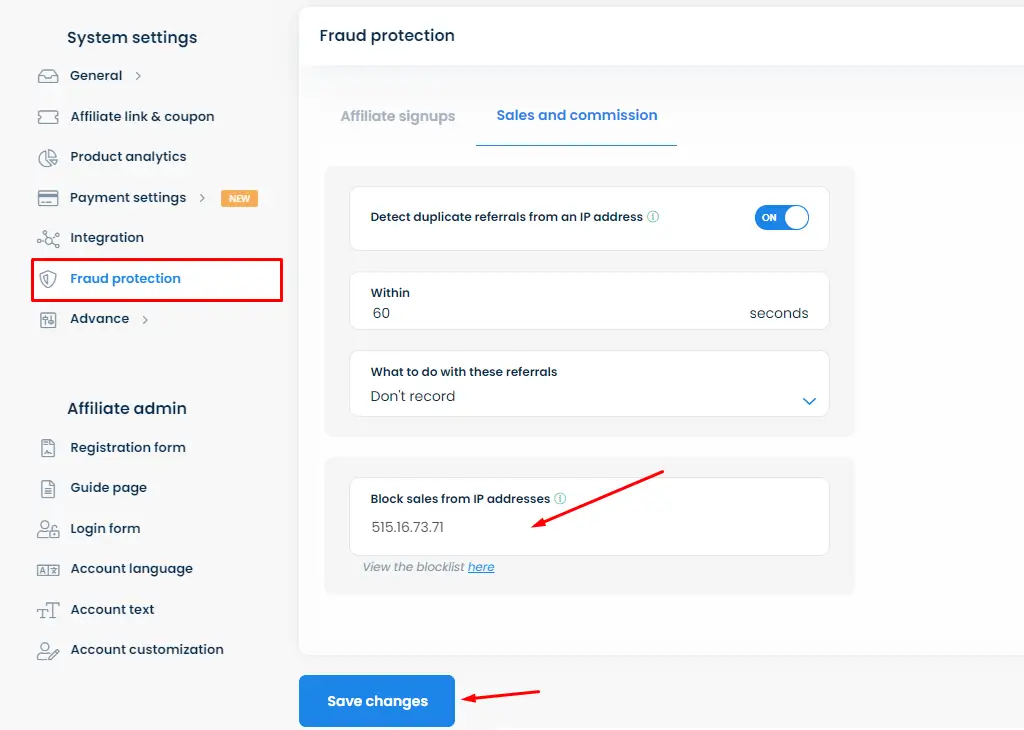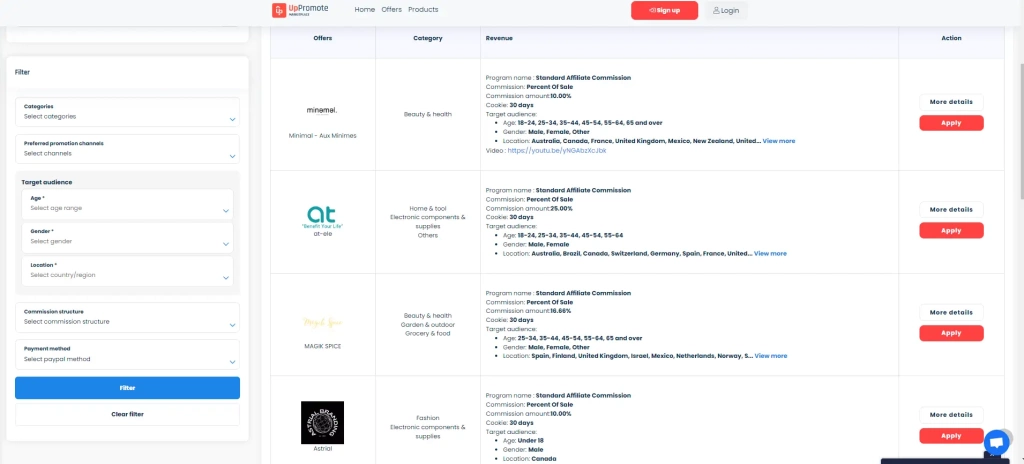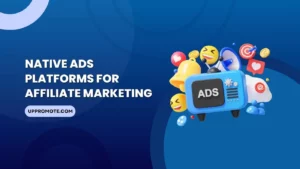Affiliate marketing has grown in popularity a few years back. The driving force is that its performance-based marketing guarantees sales for any merchants and good money for affiliates with little effort.
While it’s undeniable the potential of affiliate marketing for businesses and marketers, there’re still a lot of affiliate marketing scams that both of you consider.
This article will reveal common affiliate marketing scams you should avoid in 2024. We’ll explain them in detail and ways to realize and prevent them.
What is affiliate marketing?
Affiliate marketing is a performance-based marketing approach that rewards individuals, known as affiliates, for promoting your products or services. Affiliates are responsible for promoting the merchant’s offerings to their audience and receiving a commission in exchange for each sale they generate.
Three main parties are involved in affiliate marketing: the merchant, the affiliate, and the customer. The merchant is the business selling the product or service, while the affiliate promotes the product to their audience. The customer purchases the product through the affiliate’s referral link.
Is affiliate marketing legit?
Is affiliate marketing a scam? The answer is no.
As I mentioned, affiliate marketing is an effective way for online businesses to grow revenue and for affiliates to make a good income and incentive.
This is how affiliate marketing works:
#1 Merchant and affiliate collaborate either through a third party or directly
#2 The affiliate shares the product/service (typically through a referral link/ a coupon) to their audience
#3 The potential customer gets engaged with the affiliate’s link
#4 The customer arrives at your landing page
#5 The consumer purchases your product
#6 The affiliate earns a commission
In other words, affiliate marketing is a legit way to make money.
Is affiliate marketing a pyramid scheme?
No, affiliate marketing is not a pyramid scheme. While affiliate marketing and pyramid schemes involve making money through referrals, they differ significantly.
In affiliate marketing, promoting and selling goods/services to customers generates commissions. The commission is based on the actual sales that the affiliate generates.
Pyramid schemes rely on recruiting members to earn commissions from their enrollment fees rather than actual sales of products. They are illegal in many countries as they are considered deceptive and harmful to participants.
What are affiliate marketing scams?
Affiliate marketing scams use deceptive strategies within the affiliate marketing framework to deceive businesses. In these scams, criminals use various techniques to generate fraud sales, leads, or clicks to earn illegitimate commissions.
Affiliate marketing is preferred for online business beginners since it doesn’t require a large budget, and brands only need to offer actual commission rates for those bringing sales.
That’s why it’s also a magnet for scammers. It projects that affiliate frauds will result in a financial loss of around $100 billion for merchants by 2023, which poses a threat to affiliate marketing businesses.
Being aware of the different types of scams in affiliate marketing and learning how to prevent them is crucial.
What are the reasons behind affiliate marketing scams?
Scams involving affiliate marketing occur for several reasons, including:
Easy access: Affiliate marketing programs are often easy to join, with little to no verification process, making it attractive to scammers looking for quick ways to make money.
High commissions: Some affiliate programs offer high commission rates, which can tempt scammers involved in deceiving practices o earn large commissions quickly.
Anonymity: Anonymity can enable scammers to hide their true identity without fear of detection.
Quick profits desire: Scammers driven by the desire for quick profits to exploit the system for personal gain.
Examples of affiliate marketing scams
Target’ case
Target, a major U.S. retailer, suffered lost more than $2 million in 2017 due to fraud by some of its affiliates, including using stolen credit cards to purchase products and receiving commissions on those purchases.
The company then implemented measures to strengthen its affiliate program, including tighter vetting, increased monitoring, improved fraud prevention, and a revised commission structure.
These actions helped improve the program’s quality and integrity, prevent further losses, and maintain the company’s reputation and customer trust.
Wayfair’s case
Wayfair, an US-based interior eCommerce business, suffered from a scammer who created fake websites to promote their products and earn commissions without delivering products. The scammer never delivered the products to customers and kept the commissions for themselves.
Wayfair tackled the issue by tightening their affiliate program guidelines, increasing affiliate fraud detection efforts, and working with law enforcement to prosecute the scammer.
Affiliate marketing scams that brand need to avoid
Fake referral
Fake referral fraud is one of the popular affiliate marketing scams in which scammers send fake leads or referrals to an advertiser or merchant to inflate the statistics and defraud the firm for commissions.
Fake referrals are frequently made up of synthetic identities, and most people are unaware that portions of their identities have been stolen.
In this type of marketing fraud, stolen data, frequently exchanged on the black market, is utilized to fake a real encounter.
Scammers will use a person’s personal information to fill out a form indicating interest in a product or service. They can gain income by using a specific affiliate link. The merchant pays for an unqualified referral that is not accurate.
How to spot fake referral?
To spot fake referrals, here are some things you can look out for:
High Volume of Referrals: If you notice a sudden increase in the number of referrals, it could be a sign of fake referrals. A significant referral jump without any corresponding increase in sales or engagement is a red flag.
Suspiciously Similar Referral Data: If you see many referrals with the same or very similar data, such as name, email address, or phone number, someone may be using fake identities to generate referrals.
Lack of Engagement: If the referrals are not engaging with the product or service meaningfully, it could indicate that they are fake.
Referral Source: If the referral sources are questionable or unknown, it could be a sign of fake referrals. Check the referral sources to see if they are legitimate and credible.
How to avoid fake referral?
Join a Trusted Affiliate Network: Join a reputable affiliate network with a good reputation for monitoring and preventing frauds. Look for affiliate networks with strict policies and procedures to verify and track referrals.
Verify Referral Data: Before approving a referral, verify the data provided, such as name, email address, and phone number. Check the referral data against other sources, such as social media profiles, to ensure it is legitimate.
Monitor Referral Activity: Monitor your referral activity regularly to detect unusual patterns or sudden referral spikes.
Use Auto Fraud Detection Tools: Some affiliate tools can help you identify and prevent fake referrals, UpPromote is a powerful affiliate and referral tool to help you prevent suspected sales by detecting duplicate referrals from an IP address.
This feature can help prevent potential fraudulent sales originating from a particular IP address by allowing you to set a timeframe for the system to automatically flag and block any recurring sales from that IP address.
Cookie stuffing
Cookie stuffing is an affiliate marketing scam in which fraudsters install harmful tracking codes from various affiliate networks on a visitor’s computer. The fraudster can pocket the commission if the visitor purchases on another retail site.
This ad affiliate fraud, also known as cookie dumping, results in incorrect attribution, allowing the false affiliate to collect a percentage of the sale while doing nothing to market the goods or support the transaction.
How to spot cookie stuffing?
Unusual Traffic Spikes: A sudden surge in traffic to your website or a specific page could be a sign of cookie stuffing.
High Bounce Rates: If many visitors to your website leave immediately without taking action, it could be a sign of cookie stuffing. Fraudsters use automated tools to generate clicks that don’t result in any engagement, causing a high bounce rate.
Unusual Affiliate Behavior: Resulting when an affiliate suddenly generates many clicks without any corresponding sales or engagement. This behavior is often automated and doesn’t reflect genuine user interest.
How to avoid cookie stuffing?
Monitor Your Traffic: Regularly monitor your website traffic and look for unusual spikes or patterns. This can help you detect fraudulent activity early and take appropriate action.
Be Selective with Affiliates: Carefully vet your affiliates before approving them to promote your products or services. Find affiliates with a genuine interest in your brand and a track record of generating legitimate sales.
Human fraud/ Click Spam
Another affiliate marketing scam is human fraud. Some settings employ many people to click on advertising, such as filling out forms or doing other tasks on your website.
How to spot click spam?
Suspicious User Behavior: Look for consistently clicking on ads or filling out forms but never making a purchase.
High Click-Through Rates but Low Conversions: Occur when a high number of clicks on your ads but low conversion rates.
Inconsistent Activity: A sudden surge in clicks or a high number of form submissions in a short period, it could be a sign of click fraud.
How to avoid click spam?
Implement Click Affiliate Fraud Protection: Consider using a third-party protection service to help monitor and block fraudulent activity on your website.
UpPromote helps prevent paid clicks and form fills by blocking suspicious IP addresses and other sources of fraudulent activity.
Go to UpPromote Dashboard > Settings > Fraud protection > Click on tab Sales and commission.
Insert IP address in Block sales from IP addresses > Save changes to complete.
Transaction fraud
Transaction fraud, often known as “transaction laundering,” occurs when a fraudster uses stolen credit card or payment account information (such as Venmo or PayPal) to conduct a transaction from the account of an associate partner.
When a brand is the victim of an affiliate scam, they pay for more than just the first attack. They first lose the initial transaction value.
They will subsequently forfeit any commission given to the affiliate account and any chargeback costs incurred when the affiliate files a chargeback for the fraudulent transaction.
How to spot transaction fraud?
Irregularities in Referral Data: Check for anomalies in referral data, such as missing or incomplete information. This could indicate that the referral was not genuine and was created by a fraudster.
Suspicious Sales Patterns: Again, look for unusual sales patterns, such as a high number of sales from a single IP address or device.
How to avoid transaction fraud?
Verify Referral Data: Take steps to verify referral data, such as requiring confirmation of their payment options.
Monitor Sales Volume and Patterns: Keep an eye on sales volume and patterns, such as unusual spikes or a high number of sales from a single affiliate.
Conduct Regular Audits: Review your affiliate program’s data regularly to identify irregularities and potential fraud. This can help you stay ahead of fraudsters and prevent financial loss.
Fake products/ service
A fake product scam is a type of fraud in which scammers construct advertisements or websites (cloning a website) for items or services that do not exist.
To capture the trust of potential buyers, the fraudster would typically market the wrong items under the pretext of a well-established firm, even going so far as to misrepresent a renowned company’s website and logo.
This fraud is particularly deceitful since scammers may use the reputation of influencers and other popular websites to persuade customers to buy fake items.
How to spot fake products?
Usually, these cloning websites may target your customers, it’s easily for you to figure out the websites that are faking your eCommerce brands.
How to avoid fake products?
Educate your customers: Ensure they know your official website and how to identify it. Encourage them to report any suspicious activity or unauthorized use of your brand name.
Register your brand and trademarks: Register your brand and trademarks with the relevant authorities to prevent others from using them illegally.
Secure your website: Make sure your website is secure by using SSL encryption, updating software regularly, and using strong passwords.
Limit access to sensitive information: Only grant access to sensitive information, such as customer data or financial information, to authorized personnel.
URL hijacking
URL hijacking is also a different type of scam in affiliate marketing, often known as ‘typosquatting,’ which occurs when a fraudster purchases a URL identical to a legal retailer’s. The scammer then leads traffic to the bogus website to collect affiliate commissions.
The hacker will easily integrate affiliate links and data into their reroute process to benefit from that perception.
For example, if a customer misspells a letter or phrase in the URL of a reputable brand, they may unknowingly be led to the fraudster’s site.
The fraudster may even clone the essential elements of the original site and use them in a series of descending scams, charging the advertiser an undeserved fee while installing harmful software.
How to spot URL hijacking?
If your brand goes big, it increases the chance for hijackers to scam your customers. Ask the customers to:
Watch out for redirects: If they click on a link, it takes them to a different website or landing page unrelated to the original link.
Look for inconsistencies: If the design or layout of the website looks different from what customers are used to or what you expect, it could be a fake website created to steal your information or commissions.
How to avoid URL hijacking?
Use secure website protocols: Ensure your website uses a secure protocol like HTTPS, which encrypts data transmitted between the website and the user. This makes it more difficult for scammers to intercept and redirect your website’s traffic.
Educate your audience: Educate your audience about the risks of URL hijacking and how to spot fake links. Encourage them to only click on links from trusted sources and to verify the destination URL before clicking on any links.
Google Ad Hijacking
Google ad hijacking is a type of affiliate marketing fraud in which scammers generate fake ads that appear above authentic search results on Google to hijack your company’s paid advertisements.
The scammers can then redirect your direct traffic by using branded keywords and tempting customers to click on fake affiliate links.
How to spot Google ad hijacking?
Check the search engine results page (SERP) for suspicious ads unrelated to your company or brand.
Look for ads that are similar to your company’s ads but with slightly different URLs or landing pages.
Monitor your website’s traffic and check for any sudden drops in traffic or changes in your visitors’ behavior.
Keep an eye on your ad campaigns and look for any unexpected changes in performance metrics, such as click-through rates, conversion rates, and cost-per-click.
How to avoid Google ad hijacking?
Conduct regular audits of your ad campaigns and review your Google Ads account for any unauthorized access or changes to your settings.
Use brand protection tools: If you want to monitor and report any unlawful use of your brand or trademarks, consider adopting brand protection solutions.
Use ad verification services: to verify services to check the validity of the ads that are shown on your website or social media sites.
Set up negative keywords: Create negative keywords for your ad campaigns to stop them from appearing in pointless search results.
Report suspicious activity: Report any suspicious activity to Google immediately. You can also file a complaint with the Federal Trade Commission (FTC) or other relevant authorities.
Affiliate marketing scams that harm affiliate marketers
Above are prevalent affiliate marketing scams and their potential impact on your business.
Be aware of these scams for yourself and your affiliate partners, as they may fall victim to similar frauds. It’s crucial to keep them informed about potential scams in the affiliate marketing industry.
Get rich quick scheme
One of the most common affiliate marketing scams your partners may fall victim to is the “get-rich-quick” scheme, which falsely promises large amounts of money with minimal effort.
There are hundreds of such advertisements on the Internet.
Typically, these scammers would persuade you to enlist in their firm for a few hundred dollars.
They’ll convince you you’ll learn the secrets of making millions of dollars.
You’ll get a ding on your bank account when you transfer your $200 (or whatever much they need).
Regardless of how needy or impoverished you are, all quick wealthy schemes are scams unless proven otherwise.
It’s a fraud if you hear someone has a “secret” way to get money.
Pay-to-join programs
Another common affiliate marketing scam is requesting that individuals join a program or pay for membership.
All of the affiliate programs on UpPromote Marketplace are free to join and have no fees.
The mere request to pay to join an affiliate marketing scheme should raise a red flag.
The majority of these pay-to-join programs are nothing more than pyramid schemes.
If you’re serious about finding an affiliate marketing program, you should research to ensure that the people involved with the network are authentic and have actual clients.
Don’t sign any paperwork or checks until you’ve confirmed you’re working with legitimate businesses!
Promote Fake Products
A fraudulent practice in affiliate marketing involves advertising or creating a webpage for a non-existent product or service. Scammers will deceive potential customers by using the name of a reputable brand to gain their trust.
So keep in touch with your partners to be aware of those websites promoting fake items/service.
Spoof Traffic
Spoof traffic is an affiliate marketing scam in which scammers send fake click and impression data to make it appear authentic, often using bots and spam. This type of scam is typically found in Pay-Per-Click (PPC) affiliate programs.
The scammer earns money from the clicks, and the marketing analytics program reports many referrals to the retailer’s site, despite it all being generated by bots.
Tips for affiliate marketers to avoid affiliate marketing scams
Testimonials
It would be best if you asked the brand for testimonials. Don’t believe the reviews they provide on their website. To understand more about how they offer, request the names and email addresses of individuals you may contact.
Don’t be thrown off if you come across some unfavorable reviews. Some folks are just not cut out for specific programs. Things will most likely be alright because there are more positives than negatives. You may also use these testimonials to learn what to do and avoid.
Look for Free Signups Affiliate Program
If you have to pay to join, it might be a multi-level marketing scheme or an internet marketing fraud.
Browse the website
The firm’s history should reveal whether or not they are reliable. Examine their website to see if you can get the relevant information.
A good affiliate program has a track record and has been in operation for a long time.
Customer support
If you have any issues, you should be able to contact the merchant. They should also give product marketing suggestions. A genuine brand always wants you to succeed since it will improve performance if you do well. It should feature a toll-free phone number and an email address for customer service.
An excellent test is to email the firm with some straightforward inquiries. You might reconsider proceeding with this brand if it takes them weeks to answer. If they have communication problems, they may have additional internal problems.
Find the brand on SERPs
You can confirm an affiliate program’s validity by conducting a short web search. A well-known scam will always have unhappy victims’ complaints and reviews. Even if there aren’t many complaints, five unfavorable remarks should be enough to steer clear.
You can also use Google to assess whether or not an affiliate program is legitimate.
Conclusion
To conclude, affiliate marketing has the potential to be a reliable and efficient method for brands to increase sales, it is crucial to be careful of fraud. The affiliate marketing concept can use by dishonest people to trick businesses and earn bogus commissions. As a result, it is imperative that companies take precautions to safeguard themselves, such as carefully screening potential affiliate partners and keeping an eye on their behavior.
By following our guide, businesses can reduce their chance of falling for affiliate marketing scams by being watchful and knowledgeable.
FAQs
Is affiliate marketing real or fake?
Affiliate marketing is a genuine relationship in which individuals are compensated for promoting a brand’s products.
Is affiliate marketing a pyramid scheme?
Affiliate marketing is NOT a pyramid scam; affiliates are compensated based on the number of leads or sales they produce.
Is affiliate marketing illegal?
Affiliate marketing is entirely legal digital marketing, yet some people may use it to promote unlawful activities such as fraud.
What exactly is affiliate fraud?
Affiliate marketing fraud occurs when scammers use affiliate programs to defraud people or use various tactics to obtain affiliate commissions they do not earn. Some deceptive techniques include cookie stuffing, website cloning, typosquatting, producing bogus leads, and bot traffic.














